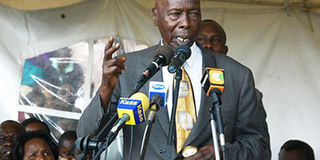Moi was a brute, but the man had a good side to him

Retired President Daniel Moi addresses the public at Tegat in Bomet. He handed over to the Opposition peacefully and went to Kabarak. PHOTO | FILE | NATION MEDIA GROUP
What you need to know:
- This the problem with Kenyan groupthink. It is always negative, always intolerant, always wrapped in a tattered shroud of self-righteousness.
- Moi’s brutality must also be placed in context. Between time immemorial and 1990, we had no political rights. The colonial state was not even fully persuaded that we were human.
Serial killers are very bad people. An evil lot, even.
My research shows that, many times, they are sick. They kill because they hear voices instructing them to end other people’s lives.
Or they are arrogant, self-important fellows who determine in their own heads that certain types of people don’t deserve to live.
Others just take pleasure in the act of killing someone, while some are driven by the desire to control other people, to take full, total sick charge of their victims’ lives.
I do not wish to draw inappropriate moral equivalences here, of course. I merely wish to dramatise the fact that even serial killers — rotten people incapable of feeling pity and other feelings common to humanity — have redeeming qualities.
Sometimes they are devoted sons to their mothers; at other times they serve the community or whatever it is.
Their redeeming qualities are nothing compared to their horrible crimes, however.
But it does serve to illustrate that evil rarely exists in its virgin state. It’s always mixed with some speck of good.
MIXED REACTION
Again, I’m not comparing former President Daniel arap Moi to a serial killer; he was nothing of the sort.
Going by the vitriol on social media, one would be tempted to think that the former president was just a bad guy who did nothing but crack skulls, torture Koigi wa Wamwere and steal public property.
The former president is responsible for crimes committed during his government; he may even have ordered some or participated in them in some way. But there was much more to him than that.
We in the media have been hammered by the chattering masses on Twitter because of trying to present a balanced picture of Moi.
In the view of many of those who have given vent to their opinions, Moi was an unmitigated disaster and we shouldn’t say anything positive about him; everything he did was bad.
And this the problem with Kenyan groupthink. It is always negative, always intolerant, always wrapped in a tattered shroud of self-righteousness.
FIGHTING DISSENT
I consider myself a victim of Moism. I made my bones fighting President Moi. His kleptocracy destroyed our lives.
I saw the victims of State-sponsored violence with arrows in their bodies. I saw the charred remains of the Foreign Affairs minister Robert Ouko. I rioted in the streets, battled the General Service Unit and drank a sea of tear gas.
My first boss was a political detainee. I started my career by covering and mixing with people who had been broken by the brutal Kanu regime.
When Narc defeated Kanu in 2002, I was pleased as a Kenyan. I covered President Mwai Kibaki’s swearing-in.
But when the crowd pelted Moi with mud, I was very offended. I thought that rowdy mob was being disrespectful and totally missing the point.
Mr Moi did not come looking for us in our farms or classrooms and send us to Nyayo House for torture.
He smashed his boot in our faces when we challenged his authority and when we tried to remove him from power.
POLITICAL RIGHTS
Yes, it was our right to challenge him and it was within our rights to assert our freedom to be governed under a government of our choice.
But I think it would be rather naive to have expected Moi to invite us to Kabarnet Gardens for a cup of tea and hand over to us the keys to State House.
Moi’s brutality must also be placed in context. Between time immemorial and 1990, we had no political rights. The colonial state was not even fully persuaded that we were human.
During the government of Mzee Jomo Kenyatta, the very idea of human rights was patently laughable.
In newspapers, we edit pictures to fit by cropping — that is, sometimes cutting off parts of the photo, such as the legs.
An old journalist once told me that “cutting Mzee’s legs” was not the done thing unless you wanted to get into some very serious trouble.
PEACEFUL HAND OVER
This is not to excuse Moi’s behaviour; he could have done much better. But he was a limited man and not fully capable of rising to greatness.
But there are things he got right. First, he obeyed the law and retired peacefully.
Secondly, when Uhuru Kenyatta lost the election, Moi did not allow the people in his circle to talk him into trying some funny business.
He handed over to the Opposition peacefully and went to Kabarak, where he lived quietly in retirement until his death. He never tried to make a political comeback or meddle in stuff.
Let us not forget that, even though Moi, in the views of many people, overstayed his welcome, through all the brutality and looting of the Kanu system, he kept the country together until 1992, when the State supported killings and evictions of Kenyans in the Rift Valley.
Even as we lambaste him in death, let us not forget that part of Moi’s legacy is something that we have that many African countries can only imagine: we are at a place where the peaceful transfer of power is now almost routine.
Let the former President rest in peace. Forgiveness is a far greater virtue than the mean nursing of old grudges, which is not a virtue at all.





